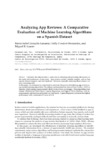Analyzing App Reviews: A Comparative Evaluation of Machine Learning Algorithms on a Spanish Dataset
Title
Analyzing App Reviews: A Comparative Evaluation of Machine Learning Algorithms on a Spanish DatasetDate
2024Abstract
"Currently, the internet plays a main role in collecting and providing information on the needs and preferences of app users. App reviews contain valuable insights, such as bug reports, feature requests, and user feedback. However, manually analyzing these reviews is a time-consuming task.
In this paper, we conducted an experiment to automate the process of analyzing app reviews using machine learning algorithms. We utilized and translated the dataset from Gu et al. (2015) to Spanish, which contains approximately 34,000 reviews from several apps. Three algorithms were trained: Multinomial Naive Bayes, Logistic Regression, and Support Vector Machine, with hyperparameter optimization performed via Grid Search. Logistic Regression achieved the highest performance with a maximum F1-score of 0.74."
Keywords
Multinomial naive Bayes
Support vector machine
Logistic regression
Support vector machine
Logistic regression
Editor version
Rights
Atribución 4.0 Internacional







